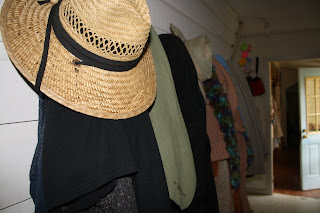
Tales from the Commune, Part III
I guess I should give you all more of a context for where all of this occurred and give you a tour o’ pictures as it were.
The Farm is a community that started out as a commune in the 70’s, and I recommend checking out all the really interesting history here.
Within the Farm there is the Ecovillage Training Center, which teaches apprenticeships on organic gardening and natural building and various workshops on everything from solar panel installation to growing shitake mushrooms. The ETC consists of a little area which includes the Ecovillage hostel, where everyone lives, cooks, and cleans communally, an organic garden, a few experimental natural building works-in-progress, various broken down school buses from the original caravan that some of the permanent ETC residents live on, and a smattering of other structures.

This is the Ecovillage Hostel, where everyone stays. It was built by the original Farm crew using recycled materials and used to be a multi-family dwelling.

A little political art.

This was the "hodge-podge lodge" which was basically an experiment in all different types of natural building. We were working in here to make the bench.
 This is one reason natural building is so wonderful...not everything is 2x4's and right angles. You can create sculpture right into your wall.
This is one reason natural building is so wonderful...not everything is 2x4's and right angles. You can create sculpture right into your wall. And you can re-use glass bottles to take up space, let in light, and decorate. There's so much freedom in natural building.
And you can re-use glass bottles to take up space, let in light, and decorate. There's so much freedom in natural building. This was the Green Dragon building. The roof and some of the interior still aren't finished, but I believe it's the largest cob structure around and has some pretty beautiful details inside!
This was the Green Dragon building. The roof and some of the interior still aren't finished, but I believe it's the largest cob structure around and has some pretty beautiful details inside!
The garden gate where they grew everything from tomatoes to kale. And man, I didn't even know what kale was before but I have more than made up for lost time since then.

Organic permaculture garden.
They actually take a step further than just organic (not using pesticides or oil-derived fertilizer).
They grow with a method called permaculture, which is aimed at being sustainable and mimicking natural systems. Pretty much hippie for bad ass.

They actually take a step further than just organic (not using pesticides or oil-derived fertilizer).
They grow with a method called permaculture, which is aimed at being sustainable and mimicking natural systems. Pretty much hippie for bad ass.

The door to the greenhouse.








No comments:
Post a Comment